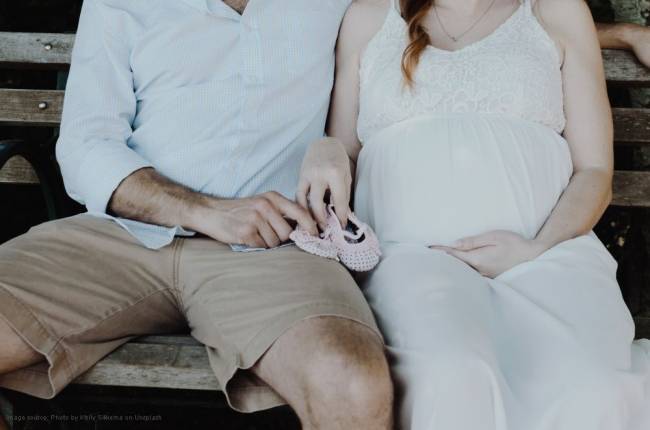Ultrasound scans offer dads the amazing opportunity of seeing the baby you’ve helped make! But, there is a lot more to them than getting some exciting pictures. Read on to find out what to expect at baby scans.

Ultrasound scans promise an exciting glimpse of the new life you have created. But they can be a nerve-wracking time too. Technological advances and an increasingly popular range of private packages mean there’s a lot to consider – and decisions to make about how much you really want to find out.
To scan or not to scan?
NHS scans are medical screening tests which are offered to all pregnant women, but there is a choice about whether you accept them or not – they are not a requirement for receiving antenatal care.
Some people want to find out if there are any problems or concerns within the pregnancy so they can be prepared and have more options; others feel that the result won’t change how they feel or their choice of actions, so they don’t need to know. There is no right or wrong, just what feels right for you as a family.
Tip: If you choose to have a scan, be clear about the information that you do and do not want to be told.
How is a scan carried out?
Most scans are carried out by specially trained staff called sonographers and take around 20-30 minutes. The sonographer will put ultrasound gel on your partner’s tummy and use a handheld device called a probe over the skin. It is this probe that sends out the ultrasound waves and picks them up when they bounce back, translating them into a computer image of your baby. Some hospitals charge a fee if you want a photo to take away.
How many baby scans do you have?
There are two routine scans (usually 2D) offered on the NHS. Further scans might be recommended in the case of twins, risk of premature labour or where there are concerns over the baby’s growth.
A Dating Scan is usually around 11–14 weeks and is used to look for a heartbeat, check how many babies there are and estimate when your baby is due. A dating scan can include a nuchal translucency (NT) scan which is part of the combined screening test for Down’s syndrome, if you choose to have this screening.
An Anomaly Scan is usually around 18-21 weeks and looks in detail at the baby’s bones, heart, brain, spinal cord, face, kidneys and abdomen. It allows the sonographer to look specifically for 11 conditions (some of which are very rare) and to check the amount of amniotic fluid, the cord flow and where the placenta is positioned.
Tip: Be prepared for lots of silences in the scan while your sonographer checks things carefully and – they may even call in a colleague for a second opinion. But you will be told the outcome of your scan while you are there.
New dad Colin recalls being quite anxious during the scan: “When the sonographer was taking all the measurements, she went really quiet and I remember getting very worried that something was wrong for what seemed like ages. It was a huge relief when she finally said everything seemed normal.”
Private scans
Private clinics can offer a range of additional scans including early reassurance scans from six weeks, gender reveal scans and “bonding” videos. Their packages can include 3D images, 4D video clips of your baby or 5D/HD Live scans which use special software to give you a detailed, full colour view of your developing baby.
Tip: Do check the clinic is registered with the Quality Care Commission and be clear about exactly what is included in your package. For example, are free re-scans are offered if baby is “camera shy” on the day?
Girl or a boy?
It is possible to tell whether you are expecting a girl or a boy from around 16-17 weeks of pregnancy, but this does depend on whether you baby is in a co-operative position on the day! Whether your hospital will tell you the sex of baby at your Anomaly Scan depends on their individual policy. If their policy is not to tell you, you can either wait for a surprise, or pay for a private scan to find out.
Warning: Be aware that it’s not always possible for the sonographer to be 100% certain, so sometimes mistakes can be made.
Are there any risks?
Routine ultrasound scans offered in pregnancy have been used widely in medical practice for over 50 years, with no conclusive evidence of adverse side effects. There is more uncertainty in the use of ultrasounds for non-diagnostic reasons, such as for “souvenir” 3D/4D/5D photos or videos. These tend to require much longer scans, which have not been proven to be either safe or unsafe. It’s a personal choice.
Ultrasound examinations should always be performed by specialist healthcare professionals, who are well trained in ultrasound safety, and who can ensure compliance with exposure guidelines.
What if the scan shows something is wrong?
There is always a possibility that your sonographer may find a potential concern during your scan. Further tests may be offered as a result, such as amniocentesis, which unfortunately can carry their own risks including miscarriage. You will be given more information so you can discuss your options with your partner, midwife and consultant. You may also be referred to a specialist.
Are scans accurate?
While routine scans can be reassuring, it is also important to balance them with the understanding that they cannot diagnose everything. Many heart defects for example cannot be seen until after birth.
Should dads attend scans?
It’s a wonderfully exciting way to connect with your baby. Some dads say it’s the first time they felt a real bond with their baby. New dad Matt recalls: “I knew we were pregnant, but it didn’t really compute until that first scan. Seeing our baby on the screen and getting that scan photo meant it was really happening and gave me something to focus on.”
Scans are most often amazing experiences, but they are diagnostic tests, and on occasion will find something concerning. Although you cannot change the outcome, just being there to support your partner can be enormously reassuring.
Tip: Most hospitals do not allow children to attend scans, although this is usually an option at private clinics. It’s best to check this before your appointment.
Can fathers take time off to be at the scans?
Yes! Fathers and partners have the right to take unpaid time off work to accompany expectant mothers to up to two antenatal appointments, which include scans. If you wish to attend more than two antenatal appointments then you could talk to your employer about taking additional unpaid leave, or book time off using your annual leave.
Help and support
Antenatal Results and Choices (ARC) offers information and support to parents before, during and after antenatal screening – including bereavement support. This can include support in making difficult decisions about further testing, or the future of the pregnancy.
Want to talk to other dads? Come and join our friendly forum.








